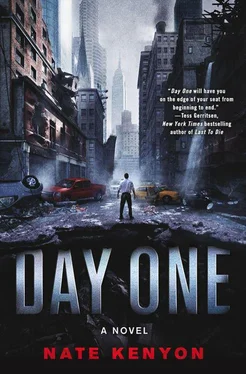Hawke glanced at the sheet of printed instructions for lattes and cappuccinos lying on the table and sighed. He didn’t need a specialty drink. Luckily, the beast had a separate glass carafe for regular coffee, and someone had used it this morning. There were a couple of cups still left. Even if the remains were burned, it would be better than nothing.
As Hawke reached for the carafe, he could feel the heat radiating from the gleaming machine and heard a faint hiss of escaping pressure as his fingers touched the handle. Incredibly, the smooth steel was cool to the touch, another marvel of modern engineering. But the smell of the coffee was bitter and hot.
When he pulled the glass carafe free it exploded in his hand. The sound was like a gunshot in the small room. Scalding coffee sprayed across the table and front of the shiny machine; glass shards bounced off the walls and floor.
Hawke dropped the remains of the carafe like he’d been bitten and felt warmth across the back of his wrist, warmth that quickly changed to a sharp pain. More warmth spread through his chest. Jesus Christ. He looked down in shock; luckily, most of the coffee and the glass had sprayed away from him, but his shirt was spotted with coffee stains and his wrist was already turning red.
The machine let out another hiss. Steam rose from somewhere inside it. Hawke yanked the plug from the outlet, then stepped back, eyeing the coffeemaker warily. He grabbed a roll of paper towels from a shelf and blotted the coffee from the table, his shock and fear quickly turning to embarrassment. Even though he hadn’t done anything to cause the mess, he felt guilty. An exploding coffeemaker. It was a silly prank, absolutely fucking slapstick comedy. Let’s get the new guy. He almost wanted to look around for the hidden camera, and he might have laughed it off except for the burn on his wrist that had already begun to throb. Not so funny after all. When he thought about it, he knew it was no prank. Just a malfunctioning piece of equipment, and he was in the wrong place at the wrong time.
Hawke swept the larger shards of glass up with a nearby dustpan and brush and deposited them in the trash. He was considering the smears of coffee on the wall when the sound of someone clearing his throat made him glance up.
“Never liked that thing,” Weller said. He was standing in the open doorway, arms crossed, leaning against the jamb. “I guess I wasn’t the only one. When you’re done cleaning up, join me in my office. We need to talk.”
Hawke considered explaining, but what could he say? I didn’t drop it; I swear—it just blew up in my hand ? When Weller stepped away from the open door, Hawke saw the copier repairman standing with his arms crossed, smirking at him.
The hacker journalist can’t figure out how to work the coffee machine. It would surely become office legend. Thank God nobody else had seen it, or things might have been far worse.
9:47 A.M.
HAWKE FOLLOWED WELLER INTO HIS OFFICE, where the man closed the door and motioned to the simple rigid wooden chair that faced his uncluttered desk. A black hard-shelled laptop case with a security lock sat against the wall next to a glass-door cabinet crammed with networking gear. The case was large enough for two laptops. There was very little else in the room.
Weller was lithe, slightly over six feet, and tended to wear dark jeans and Oxford shirts every day. Both the way he dressed and his office reflected his affection for minimalism and order. His round glasses would have seemed delicate and feminine on most men, but they served to soften what would have otherwise been a harshly angular face. He bristled with a coiled energy that kept him in constant motion, and even as he sat behind the desk he bounced slightly in his chair, hands fiddling with a pen, tapping and flicking it against the wood. “You okay?”
Hawke nodded, touched the brown spatters on his shirt. His wrist throbbed. “Just a little wounded pride.”
Weller put the pen down, then seemed to dismiss the incident entirely. When Hawke pulled out his digital recorder, Weller shook his head. “No record of this,” he said. “Not yet.”
Hawke put it away. An object slightly larger than a pack of gum sat on a corner of the desk. Weller picked it up. “The most advanced in government hardware,” he said. “Highly secure communications device, developed by Eclipse as part of their deal with the NSA. It has its own advanced operating system, powered by an all-new adaptive intelligence in the cloud. Nearly impossible to lock on to, uses its own satellites and encrypted five ways to Sunday. Big power comes in small packages.” He handed the phone to Hawke. “I thought you’d appreciate this. Communication is everything in your line of work.”
Still smarting from the encounter with the coffee machine, this was the last thing Hawke had expected. He turned the object in his hands. It appeared seamless, with an edgeless, glossy screen and nothing else. There was no immediate way to tell how it might operate. He resisted the urge to play with it; now was not the time. He had to get Weller talking. “Does it make calls?” he said.
Weller smiled. “Borrow it for a while,” he said. “I have another. Might come in handy.”
The code of ethics for journalists was clear on accepting any kind of gift. Then again, Hawke had never cared much for rules. This tiny phone was part of the story. It would make a great sideline to the main piece; the Network lab could dissect it, piece by piece, break it down for the audience, show them its guts ahead of release. That alone was nearly big enough to satisfy Brady.
Hawke tried to keep his building excitement from showing, shoved the tiny device in his left pocket and kept his other phone in his right. “I didn’t think Eclipse would be inclined to share with you these days.”
“I liberated it,” Weller said. “It’s not in commercial development yet.”
“I’ll keep that part out of the profile.”
Weller’s smile faded. “They stole something from me; I stole something back. It’s not quite quid pro quo, but it’s a start.”
“You’re talking about the energy-sharing project?”
“Something much more important than that. Energy sharing was just the evolution of an old idea. Use the processing power of the cloud to spread out the work. When a device is running low, it borrows another networked device’s chip to crunch data and serve it back.” He stuck the pen in the middle drawer, so the desk’s surface was completely clean, then folded his hands in front of him. “Now let’s get down to business,” he said. “You want to know about my former employer. What happened when I left, and what they’re doing now.”
Of course Weller knew that the Network angle wasn’t a simple profile or a feature about his new business, but neither of them had ever been this blunt about it. “I’m not sure I understand.”
“Jonathan C. Hawke, born to a schoolteacher and a writer and political activist in eastern Massachusetts. Test scores show a boy who would excel at making the connections between things most people miss, a creative mind that would regularly reject those in authority who didn’t question the status quo. An outside-the-box thinker. Predictable behavior problems coupled with flashes of genius, an early tendency toward computer programming and storytelling that would lead to your associations with both the hacker subculture and journalism, but things didn’t start to go downhill until your father’s drinking led to his early death and you dropped out of college and got involved with Anonymous—”
“So you’ve investigated me,” Hawke interrupted. “Am I supposed to be impressed?”
Читать дальше












